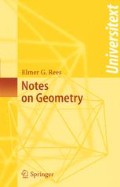Abstract
In Euclidean geometry, two triangles are congruent if one of them can be moved rigidly onto the other. Definitions such as that of congruence, which tell us when two objects should be regarded as being the same, are basic in geometry and are often used to characterize a particular geometry. Two sets A, B are defined to be equivalent if there is an ‘allowed transformation’ f such that fA = B. For Euclidean geometry the allowed transformations are the rigid motions. In his Erlanger programme of 1872, Felix Klein formulated the principle that a geometry is defined by its allowed transformations. The force of this principle is to make a close connection between geometry and group theory.
Access this chapter
Tax calculation will be finalised at checkout
Purchases are for personal use only
Author information
Authors and Affiliations
Rights and permissions
Copyright information
© 1983 Springer-Verlag Berlin Heidelberg
About this chapter
Cite this chapter
Rees, E.G. (1983). Introduction. In: Notes on Geometry. Universitext. Springer, Berlin, Heidelberg. https://doi.org/10.1007/978-3-642-61777-5_1
Download citation
DOI: https://doi.org/10.1007/978-3-642-61777-5_1
Publisher Name: Springer, Berlin, Heidelberg
Print ISBN: 978-3-540-12053-7
Online ISBN: 978-3-642-61777-5
eBook Packages: Springer Book Archive

